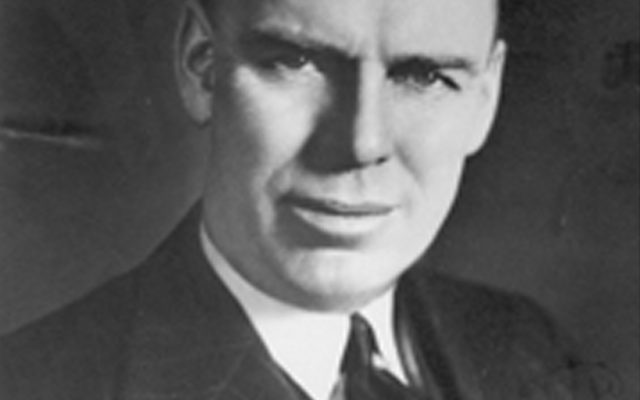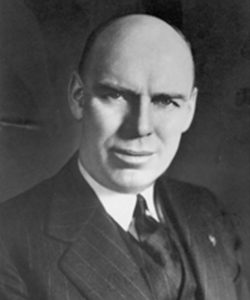
This Maine governor never publicly embraced the Klan, but he never disavowed its support
As debates rage on in Maine and around the country about the removal of monuments and renaming of buildings and locales named for slave owners, racists and other historical figures with problematic stories, other influential Mainers had similarly checkered pasts — even if there are no statues or buildings named for them.
One of the most infamous was Maine’s 54th governor, Republican Ralph Owen Brewster. His long political career at both the state and federal levels was marked by many troubling turns of events, but the most shocking was undoubtedly his association with the Ku Klux Klan in Maine.
Brewster, born in 1888 in Dexter, was first elected to office in 1916 as a state representative from Portland. The Bowdoin College graduate later served in the state Senate before running for a two-year term as governor in 1924.

Gov. Brewster
In the 1920s, after the country’s relatively brief but deeply traumatic entry into World War I, there was a strong sentiment among a segment of the population that the U.S. should stay isolated from the rest of the world’s problems, said Maine State Historian Earle Shettleworth. There was also a sense among some of those people that the country needed to return to what they saw as its traditional lifestyle — one that was white and Protestant.
“There was this deep desire to return to normalcy. In fact, Warren Harding ran for president on that tagline,” Shettleworth said. “I think there were some people who felt that their lifestyle was threatened by change, and that change was coming from immigrants and from Catholics and from, essentially, people who were different.”
The KKK, originally founded immediately after the Confederates lost the Civil War as a loosely organized group bent on the persecution of newly freed Black people, had re-emerged in 1915 better organized and as a national group, with an expanded focus on not just the hatred of Black people, but also the hatred of Jews, immigrants and Catholics. Anybody who wasn’t white and Protestant was viewed as a threat to American purity.
The KKK had set up shop in Maine to capitalize on the growing fear among some Mainers that Catholic immigrants from Quebec, Ireland and Italy were coming to take over their “traditional” way of life, Shettleworth said. By the time Brewster ran for governor in 1924, there were millions of Klan members nationwide and thousands in Maine.
In terms of Klan support, Brewster had several allies in both local and state-level politics. Fellow state Sen. Mark Alton Barwise ran on anti-Catholic and anti-Black platforms, which included his attempt to pass a bill to ban the use of public funds for private schools — essentially, Catholic schools. Brewster also served on Portland’s school committee while DeForest Perkins, who later went on to become the Grand Dragon of the Klan in Maine and a vocal political supporter of Brewster’s, served as the superintendent of schools.
While Brewster did not publicly voice his support of the Klan, nor did he publicly seek their backing, Klan members openly and in many cases loudly supported Brewster over his opponent in the 1924 Republican gubernatorial primary, Frank Farrington, the Republican Party’s preferred candidate.
Bowdoin College’s archive on Brewster has pamphlets, correspondence and other materials that show his close relationship with the Klan, even though there’s no direct evidence of his membership in the group. (One item in the Bowdoin collection is a business card from a national Klan organizer who sent Brewster New Year’s greetings in 1925, just before his inauguration as governor.)
Essentially, Shettleworth said, Brewster’s silence on the Klan spoke volumes.
“There’s no smoking gun that shows that Brewster sought the support of the Klan, but when he was repeatedly asked by the press to disavow them, he wouldn’t do so,” said Shettleworth. “It’s long been felt that Brewster quietly courted the Klan. Certainly Gov. Baxter felt that he did.”
Percival Baxter, Brewster’s predecessor as governor, strongly opposed the Klan, calling the group “an insult and affront to American citizens” in 1922. Brewster and his allies worked to defeat Baxter when Baxter ran for U.S. Senate in 1926. In turn, when Brewster ran for U.S. Senate in 1928 after serving two terms as governor, Baxter publicly denounced him, specifically calling out Brewster’s ties to the Klan. He claimed that Brewster himself was a member, and said that Brewster had offered him 25,000 Klan votes if Baxter would run for governor that year.
“He essentially comes out in the press to criticize Brewster, and makes his connection to the Klan at the center of his criticisms,” said Shettleworth. “And Brewster then lost.”
Despite his deeply unpopular association with the hate group, Brewster went on to successfully run for the U.S. House in 1934 and serve three terms. Brewster was then elected to the U.S. Senate in 1940 and re-elected in 1946.
In the Senate, Brewster became a close ally of Sen. Joseph McCarthy, who in early 1950 began spreading unsubstantiated claims of communist infiltration in government, education and the film industry. Fellow Maine Sen. Margaret Chase Smith, like her late husband, U.S. Rep. Clyde Smith, was never a fan of Brewster’s, and openly opposed both McCarthy and Brewster, famously making her Declaration of Conscience speech on the Senate floor in June 1950.
Brewster’s political career came to an abrupt end in 1952. Brewster had long opposed billionaire Howard Hughes’ commercial interests in air transport, specifically his airline, Trans World Airlines, claiming in a famous 1947 Senate hearing that Hughes had misused $40 million from the War Department during World War II. Hughes claimed, however, that Brewster was in the pocket of his rival airline, Pan Am, and made him out to be a corporate stooge who cared more about money than his constituents.
Those Senate proceedings are dramatized in Martin Scorsese’s 2004 Hughes biopic “The Aviator,” in which Brewster is portrayed by Alan Alda, who was nominated for an Academy Award for Best Supporting Actor for the role.
After the hearings, Hughes remained a bitter enemy of Brewster, going so far as to convince then-Maine Gov. Frederick Payne to run against Brewster for his Senate seat in the 1952 Republican primary, donating $60,000 to Payne’s campaign — worth about $500,000 in today’s dollars. Payne used Brewster’s long association with the Ku Klux Klan and Joseph McCarthy as a weapon, and ended up defeating Brewster, the incumbent, in the primary.
Brewster essentially retired after his Senate loss, and he died in 1961. There are no public buildings or monuments in Maine named for him. A large home in Dexter built by the Brewster family in the 1870s, originally called Zion’s Hill, is now operated as a bed and breakfast called the Brewster Inn. The building was added to the National Register of Historic Places in 1989.
As for the KKK in Maine, by 1928, membership had decreased drastically, and its influence in Maine politics had largely waned. Still, there have been isolated signs of the group’s presence in the state since then, including a 1987 cross-burning in Rumford and the appearance of KKK recruitment fliers in Freeport in 2017.
There may have been at least one active Klan chapter in the state as recently as June 2017, according to the Anti-Defamation League. However, according to the Southern Poverty Law Center, which also tracks hate groups, there are no active chapters of the Ku Klux Klan in Maine today.